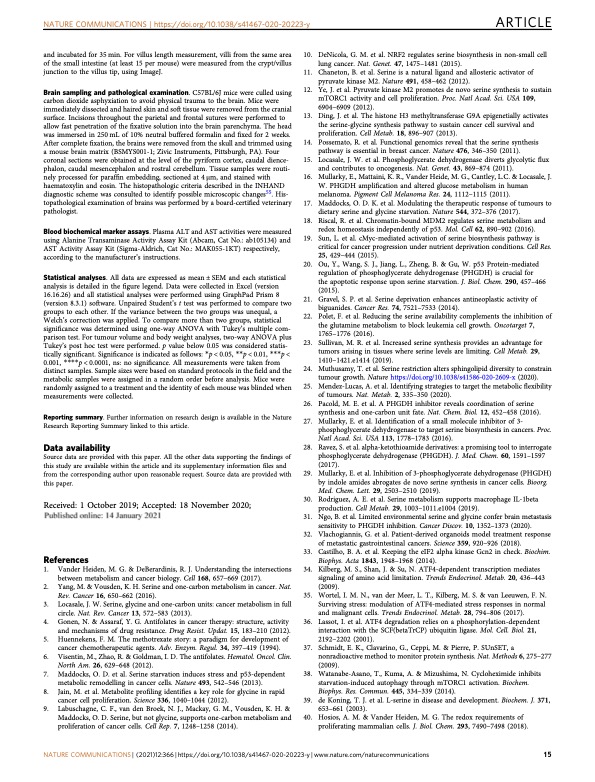M Tajan
Serine synthesis pathway inhibition cooperates with dietary serine and glycine limitation for cancer therapy
Tajan, M; Hennequart, M; Cheung, EC; Zani, F; Hock, AK; Legrave, N; Maddocks, ODK; Ridgway, RA; Athineos, D; Suarez-Bonnet, A; Ludwig, RL; Novellasdemunt, L; Angelis, N; Li, VSW; Vlachogiannis, G; Valeri, N; Mainolfi, N; Suri, V; Friedman, A; Manfredi, M; Blyth, K; Sansom, OJ; Vousden, KH
Authors
M Hennequart
EC Cheung
F Zani
AK Hock
N Legrave
ODK Maddocks
RA Ridgway
D Athineos
A Suarez-Bonnet
RL Ludwig
L Novellasdemunt
N Angelis
VSW Li
G Vlachogiannis
N Valeri
N Mainolfi
V Suri
A Friedman
M Manfredi
K Blyth
OJ Sansom
KH Vousden
Abstract
Many tumour cells show dependence on exogenous serine and dietary serine and glycine starvation can inhibit the growth of these cancers and extend survival in mice. However, numerous mechanisms promote resistance to this therapeutic approach, including enhanced expression of the de novo serine synthesis pathway (SSP) enzymes or activation of oncogenes that drive enhanced serine synthesis. Here we show that inhibition of PHGDH, the first step in the SSP, cooperates with serine and glycine depletion to inhibit one-carbon metabolism and cancer growth. In vitro, inhibition of PHGDH combined with serine starvation leads to a defect in global protein synthesis, which blocks the activation of an ATF-4 response and more broadly impacts the protective stress response to amino acid depletion. In vivo, the combination of diet and inhibitor shows therapeutic efficacy against tumours that are resistant to diet or drug alone, with evidence of reduced one-carbon availability. However, the defect in ATF4-response seen in vitro following complete depletion of available serine is not seen in mice, where dietary serine and glycine depletion and treatment with the PHGDH inhibitor lower but do not eliminate serine. Our results indicate that inhibition of PHGDH will augment the therapeutic efficacy of a serine depleted diet. Dietary serine and glycine starvation has emerged as a potential therapy for cancer. Here, the authors show that inhibition of PHGDH, which mediates the first step in the serine synthesis pathway, improves the therapeutic efficacy of serine depletion diet in mouse xenograft models.
Citation
Tajan, M., Hennequart, M., Cheung, E., Zani, F., Hock, A., Legrave, N., …Vousden, K. (2021). Serine synthesis pathway inhibition cooperates with dietary serine and glycine limitation for cancer therapy. Nature Communications, 12(1), https://doi.org/10.1038/s41467-020-20223-y
| Journal Article Type | Article |
|---|---|
| Acceptance Date | Nov 18, 2020 |
| Publication Date | 2021 |
| Deposit Date | Jan 7, 2022 |
| Publicly Available Date | Jan 7, 2022 |
| Publisher | Nature Research |
| Peer Reviewed | Peer Reviewed |
| Volume | 12 |
| Issue | 1 |
| DOI | https://doi.org/10.1038/s41467-020-20223-y |
| Keywords | ONE-CARBON METABOLISM; 3-PHOSPHOGLYCERATE DEHYDROGENASE; BIOSYNTHESIS; PHGDH; HOMEOSTASIS; ACTIVATOR; TARGET; CELLS |
| Public URL | https://rvc-repository.worktribe.com/output/1554843 |
Files
OA
(215 Kb)
Image
Publisher Licence URL
http://creativecommons.org/licenses/by/4.0/
You might also like
Veterinary Comparative Pathology, a Scientific Tool for a Thriving Planet
(2023)
Journal Article
Endothelial AHR activity prevents lung barrier disruption in viral infection
(2023)
Journal Article
Pathology and causes of death in captive meerkats (<i>Suricata suricatta</i>)
(2023)
Journal Article
Downloadable Citations
About RVC Repository
Administrator e-mail: publicationsrepos@rvc.ac.uk
This application uses the following open-source libraries:
SheetJS Community Edition
Apache License Version 2.0 (http://www.apache.org/licenses/)
PDF.js
Apache License Version 2.0 (http://www.apache.org/licenses/)
Font Awesome
SIL OFL 1.1 (http://scripts.sil.org/OFL)
MIT License (http://opensource.org/licenses/mit-license.html)
CC BY 3.0 ( http://creativecommons.org/licenses/by/3.0/)
Powered by Worktribe © 2024
Advanced Search

